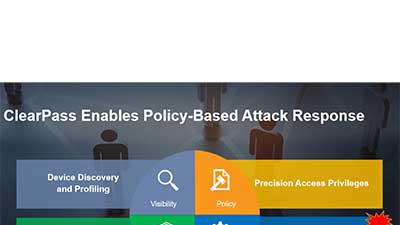CRN Interview: HPE Aruba Channel Chief Harold On New Competencies, The Importance Of Openness And The Ascent Of The Customer Experience
'It's less about the network infastructure and more about the customer experience,' says HPE Aruba's Jim Harold as the company puts plans in place to grow its partner ecosystem.
Core Competency
With the introduction of the NetInsight network analytics offering, as well as its coming SD-WAN rollout, Jim Harold, North America channel chief of Aruba, a Hewlett Packard Enterprise company, said the company is making things simpler so it can realize growth in its partner program.
The Santa Clara, Calif., company unveiled a new competency for partners during its Atmosphere conference in Las Vegas last week, and Harold said the effort allows HPE Aruba to bring training and enablement across its partner base in a uniform way.
The new competency is in HPE Aruba's Instrospect user entity behavioral analytics offering, Harold said, and partners that make the investment in earning the competency will be rewarded with a back-end rebate of between 10 percent and 16 percent.
The effort is part of HPE Aruba's overarching drive to help partners focus on open, API-driven solutions that emphasize the customer experience, Harold said.
What follows is an edited excerpt of Harold's conversation with CRN.
Does the introduction of NetInsight and an SD-WAN solution mean that you'll make program adjustments or updates?
A lot of it is timing, so today we announced to partners a new competency for the user entity behavioral analytics [UEBA] and for Introspect. If you look back, we acquired [Niara] more than a year ago and released the product and initial training. We came out with technical training for our partners, which we rolled out at the end of January. Today we announced the official competency, so now we have competencies around Meridien for location services, one around ClearPass, and the third around Introspect to give a stronger focus around security. As we're ramping, we're trying to say who are going to be our go-to partners?

How is the new competency similar to the other somewhat new ones, like ClearPass or Meridien, and will you follow the same pattern for NetInsight?
It's a heavy technical investment to understand the product. We attach a pretty robust back-end rebate to reward partners for their investment. Similar to ClearPass, now with Introspect, there's anywhere from a 10 [percent] to 16 percent back-end rebate depending on where they are in the program. Partners get excited about that, because if they're going to send their technical folks away for a couple of days, that's an investment. We kept that same model. If you fast forward to today and NetInsight, it'll probably be a similar progression.

What are you plans for partner recruitment, and how many new partners would you like to get into the security specialization over the next year?
There are a couple of segments. One is our existing base, and a lot of partners do have a separate security practice, even those that have invested in ClearPass. We've trained probably 12 or 15 partners in that competency so far, and we're going to continue to roll that out. We've got really strong penetration with ClearPass across the existing base. Out of our top tier of 500 Medallion partners, I'll bet we have close to 100 ClearPass competencies certified. We'll expect a good amount of them to pick up the Introspect competency. Then we'd be bringing on more new security-only partners that may not be that interested up front in selling infrastructure, but intrigued by selling the security portfolio.

How big a role do you need partners to play in the customer experience end of the network? Is that becoming a bigger part of the channel's game?
That's the shift. It's less about the network infrastructure and more about the customer experience. That's been our pitch and how we've trained partners. It's catching on, and it's pretty much the sales play we've developed when partners talk to customers. It's how to differentiate themselves with us. It's all about user experience. A college or university before would've said, 'We provide W-iFi.' Now, the biggest fear of an IT guy at a university is somebody tweeting out that the Wi-Fi [isn't performing well]. We're building tools now that make it more predictive. Predicting issues before everybody starts complaining is a big deal. It's a compelling story.

Is openness becoming even more important as the market changes?
If you look at a Cisco environment, it's single-vendor. ClearPass is a good example for us because we position that as our Trojan horse. We can go into an all-Cisco environment, or an all-competitive environment, and just sell ClearPass and not sell one access point, and we've won some pretty large deals that were full Cisco access points and switches.

How can you capitalize on the success you've had with ClearPass in the channel, and what services are partners attaching?
The feedback we get is that it drives a ton of services. It's as high as a dollar in services for every $3 or $4 in ClearPass. You're looking at the design of the network, all the access control. What we hear from partners is that they'll go in and a lot of customers really don't know everything that's on the network to begin with. There's heavy discovery. There's heavy design. They really have to get close to the customer and the existing infrastructure and then build it out. It's heavy lifting from a services standpoint because a lot of customers just don't have the staff. They're augmenting with our partners.